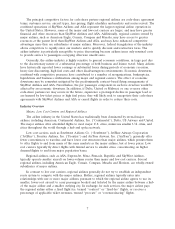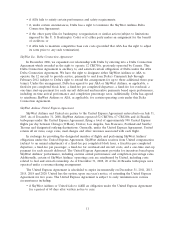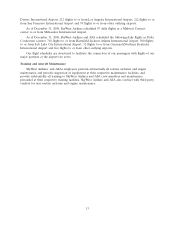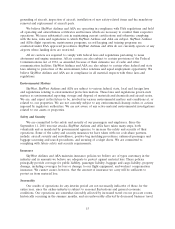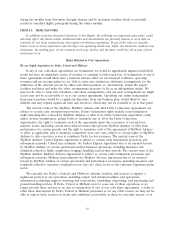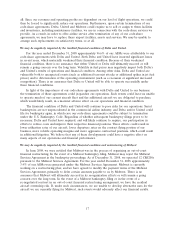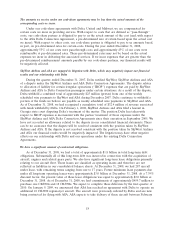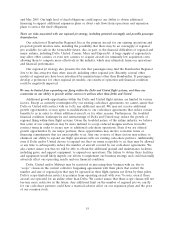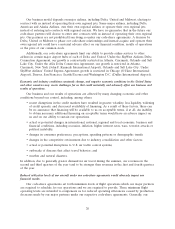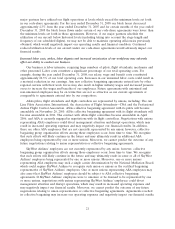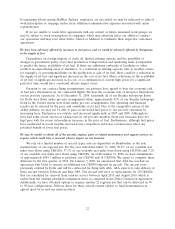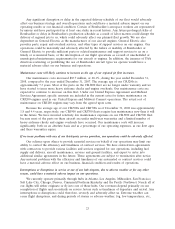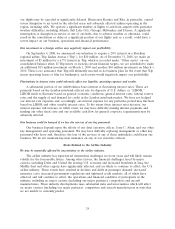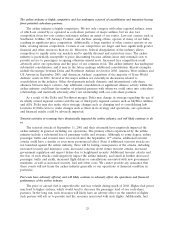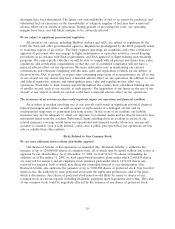SkyWest Airlines 2008 Annual Report Download - page 21
Download and view the complete annual report
Please find page 21 of the 2008 SkyWest Airlines annual report below. You can navigate through the pages in the report by either clicking on the pages listed below, or by using the keyword search tool below to find specific information within the annual report.all. Since our revenues and operating profits are dependent on our level of flight operations, we could
then be forced to significantly reduce our operations. Furthermore, upon certain terminations of our
code-share agreements, Delta, United and Midwest could require us to sell or assign to them facilities
and inventories, including maintenance facilities, we use in connection with the code-share services we
provide. As a result, in order to offer airline service after termination of any of our code-share
agreements, we may have to replace these airport facilities, assets and services. We may be unable to
arrange such replacements on satisfactory terms, or at all.
We may be negatively impacted by the troubled financial condition of Delta and United.
For the year ended December 31, 2008 approximately 96.6% of our ASMs were attributable to our
code-share agreements with Delta and United. Both Delta and United have incurred significant losses
in recent years, which materially weakened their financial condition. Because of their weakened
financial condition, there is no assurance that either United or Delta will ultimately succeed or will
remain a going concern over the long term. Volatility in fuel prices may negatively impact both Delta’s
and United’s results of operations and financial condition. Among other risks, Delta and United are
vulnerable both to unexpected events (such as additional terrorist attacks or additional spikes in jet fuel
prices) and to deterioration of the operating environment (such as a recession or significant increased
competition). There is no assurance that Delta or United will be able to operate successfully under
these financial conditions.
In light of the importance of our code-share agreements with Delta and United to our business,
the termination of these agreements could jeopardize our operations. Such events could leave us unable
to operate much of our current aircraft fleet and the additional aircraft we are obligated to purchase,
which would likely result, in a material adverse effect on our operations and financial condition.
The financial condition of Delta and United will continue to pose risks for our operations. Serial
bankruptcies are not unprecedented in the commercial airline industry, and Delta and/or United could
file for bankruptcy again, in which case our code-share agreements could be subject to termination
under the U.S. Bankruptcy Code. Regardless of whether subsequent bankruptcy filings prove to be
necessary, Delta and United have required, and will likely continue to require, our participation in
efforts to reduce costs and improve their respective financial positions. These efforts could result in
lower utilization rates of our aircraft, lower departure rates on the contract flying portion of our
business, more volatile operating margins and more aggressive contractual positions, which could result
in additional litigation. We believe that any of these developments could have a negative effect on
many aspects of our operations and financial performance.
We may be negatively impacted by the troubled financial condition and restructuring of Midwest
In June 2008, we were notified that Midwest was in the process of organizing an out-of-court
financial restructuring. In the event of a Midwest bankruptcy filing, Midwest may reject the Midwest
Services Agreement in the bankruptcy proceedings. As of December 31, 2008, we operated 12 CRJ200s
pursuant to the Midwest Services Agreement. For the year ended December 31, 2008 approximately
3.4% of our ASMs were generated under the Midwest Services Agreement. Midwest is currently
working on a restructuring plan; and we have agreed to modify the payment terms of the Midwest
Services Agreement, primarily to defer certain amounts payable to us by Midwest. There is no
assurance that Midwest will ultimately succeed in its reorganization efforts or will remain a going
concern over the long term. In the event of a Midwest bankruptcy filing or in the event of a
re-negotiated contract in an out-of-court financial restructuring arrangement, we have the residual
aircraft ownership risk. If, under such circumstances, we are unable to develop alternative uses for the
aircraft we are currently flying for Midwest, such events would adversely affect our financial results.
17


